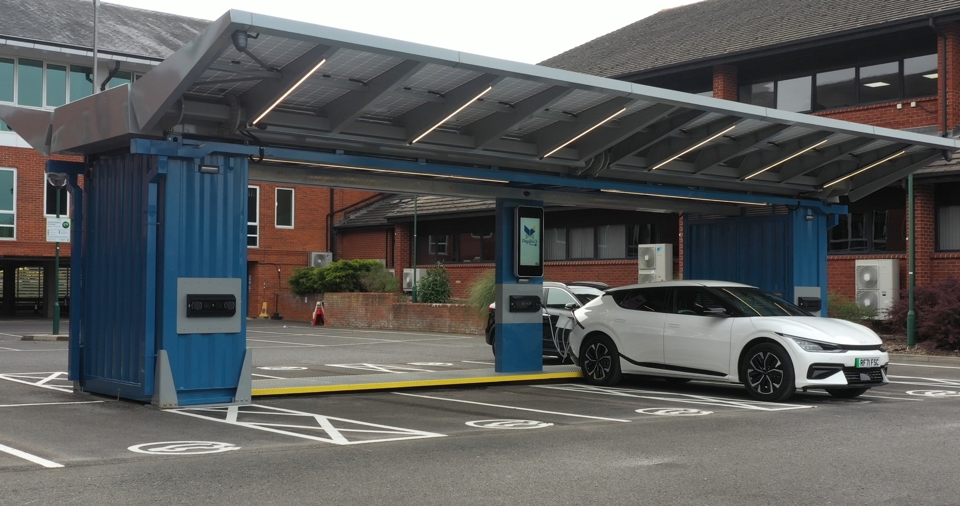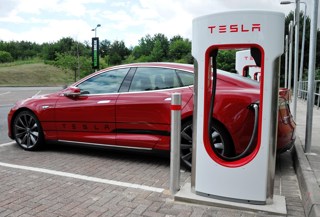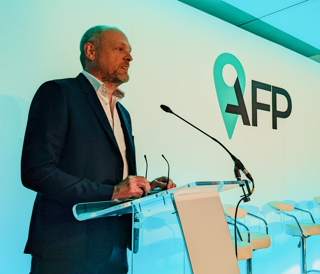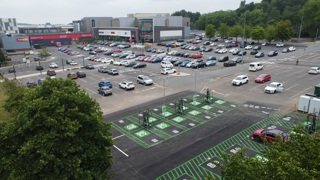A pop-up, solar-powered electric vehicle (EV) charging hub, which is deployable in just 24 hours, has been launched by 3ti.
Called Papilio3, the company says it tackles the UK’s need to expand EV infrastructure ahead of the Government’s ban on the sale of new diesel and petrol vehicles in 2030.
The unit is built around a recycled shipping container and can support up to 12 EV charge points.
The solar and battery-boosted charging system optimises the speed of charge and reduces the carbon intensity of electricity used.
Papilio3 is available from 3ti, which is funder and operator of Solar Car Parks (SCPs), on a rental contract and therefore requires no capital investment by customers.
“Overnight charging at home generally provides the most cost effective, carbon efficient, sustainable form of EV charging, but in the UK, around 50% of households will not be able to do this,” said Tim Evans, 3ti founder and CEO.
“If you live in a flat, a tower block, a rented house, in temporary accommodation or even in a £10m terraced town house in Chelsea, you’re probably not going to be able to charge an EV at home.
“We believe that solar and battery boosted destination and workplace charging will become the best EV charging solution for drivers, irrespective of the type of home they live in.
“By utilising dwell times of several hours, when cars are parked at work or when the driver is visiting a shopping or leisure venue, for example, 3ti’s system ensures that EVs can achieve a level of charge that covers day to day driving needs and does it in the most low carbon way.”
Papilio3 is fitted with three modular canopies that support 36 solar panels and has battery storage capacity of up to 250 kWh.
It has been developed by 3ti with Cambridge Design Partners and has been designed for roll-out at workplaces and public destinations such as hospitals, hotels, meeting venues, sports or shopping centres, tourist attractions and town centres.
Each unit offers sheltered, illuminated and an EV charging experience that supports a mixture of 7, 11 and 22 kilowatts.
Evans said: “Widespread adoption of SCPs will turn underutilised spaces into renewable energy generating assets and adding batteries and EV charge points will accelerate decarbonisation of the UK’s transport sector.
“Allowing businesses to generate renewable energy right outside their front door not only gives them greater control of energy costs, it also makes a huge statement to customers and visitors that they are serious about tackling climate change and reducing carbon emissions.
“By deploying fast charge points, up to 12 at a time, with Papilio3, we will provide much needed, cost-effective charge point infrastructure and expand the UK’s network of public EV charge points.”
Papilio3, says 3ti, integrates three technologies that are more usually considered individually: solar photovoltaic electricity generation, battery energy storage systems (BESS) and EV charge points.
Combining the three offers a range of benefits, including the ability to use grid energy, solar power and battery storage to optimise the speed and carbon intensity of EV charging, it added.
Onsite renewable energy generation from solar panels also reduces energy costs and gives businesses greater control over energy supply.
“Papilio3 isn’t just about providing the UK with a broader range of EV charge points,” explained Evans.
“It also focuses on the capture and management of renewable energy, as a way of reducing the country’s draw on carbon-intensive energy for EV charging at peak times."
Papilio3 units are owned by 3ti, provided on a monthly rental basis, require limited approvals and no capital investment by customers, it said.
“One of the best things about owning an EV is that you don’t have to visit a petrol station to fill up,” said 3ti chief technical officer, Mark Potter.
“As EV drivers, we want to charge when we stop, not stop to charge. Rapid charging with 50-250 kW is fine for en-route charging during long journeys, but it’s not the right solution for regular use – it increases battery degradation and pushes up electricity prices for everyone, not just those who are charging.
“If you can’t charge at home, it’s best to charge when you arrive at where you’re going. Cars are parked 95% of their time – that’s when and where they should be charged.
“Destination and workplace charging is a more sustainable option, better value and more much more convenient.
“The three technologies integrated in Papilio3 enable the system to store and use the cleanest, lowest cost energy from its own solar panels and the grid supply. That means we can reduce the demand on peak hours grid energy without compromising EV charging speed.”
The pop-up EV charging hub was unveiled at the Surrey Research Park, Guildford, home to more than 200 businesses, from newly formed start-ups to global corporates such as Airbus and BAE Systems.
Owned by the University of Surrey, the Research Park businesses employ more than 4,500 staff and was the preferred locational choice because of the park’s client base, its growing cluster of companies working on sustainability and the deep links with the University of Surrey.
Grant Bourhill, chief executive officer at Surrey Research Park, said: “The roll out of Papilio3 reflects our commitment to sustainability in addition to testing new innovation and supporting business growth.
“The University of Surrey has recently improved its position to 55th in the global sustainability rankings of over 1400 institutions, and the work with 3ti is yet another example of our sustainability commitment.”
> Interested in comparing electric vehicle data? Check out our EV tool.
> Interested in ensuring the efficient use of EVs. Check out our dedicated editorial sections: Insight & policy | EV news | Charging & infrastructure | Costs & incentives | Benefit-in-kind | EV case studies | EV road tests





















Login to comment
Comments
No comments have been made yet.